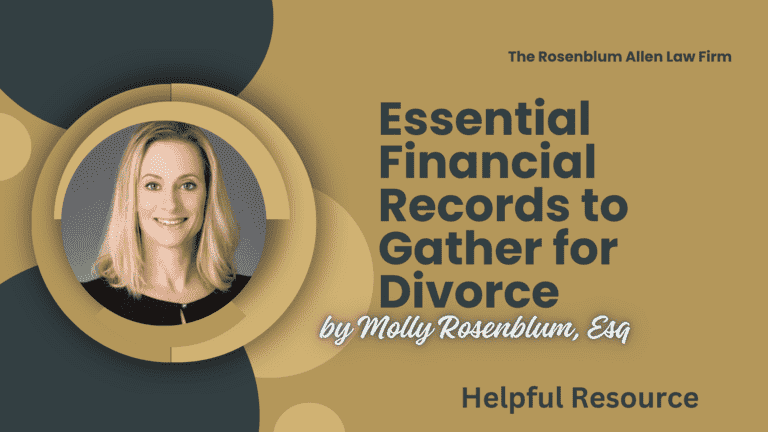Hey there, Las Vegas friends! Facing a divorce can be like finding your car in a crowded casino parking lot; it’s overwhelming, and you wish you had a map.
Well, when it comes to sorting out your finances during a divorce, consider this article your GPS. We’ll guide you through the hustle and bustle of dividing assets and setting up for your new start.
So, buckle up! We’re about to make this journey a whole lot smoother.

Understanding Nevada Divorce Law
Before diving into those dollar signs and decimal points, let’s discuss how divorce works in our neon desert. See, Nevada is what you call a “community property state.” That means everything you and your spouse earned or bought while married is usually split 50/50. But remember, what happens in Vegas doesn’t always stay in Vegas, especially if it involves your finances.
Community Property State Basics
Simply put, it’s likely shared if it was earned or bought during the marriage. That includes your house, salary, and even those winnings from last Saturday’s poker game.
Las Vegas Jurisdiction Considerations
Las Vegas has its local laws and courts that handle divorce. So, you’ll need to play by our rules, which might differ slightly from the rest of Nevada or your cousin’s divorce in another state.
Preparing Your Divorce Financial Checklist
Alright, let’s roll up our sleeves and get into the nitty-gritty. Making a financial checklist is like packing for a vacation; you don’t want to leave anything important behind. Here’s what you’ll need to gather:
Personal Financial Documentation
Grab all the paper trails that show what you own and owe. Here’s a starter pack:
- Bank accounts: Get those statements that show how much cash you’ve got on hand.
- Credit card statements: These bad boys show what you owe and how you’ve been spending.
- Loan documents: Got a car loan or a personal loan? Bring that paperwork to the table.
Marital Financial Documentation
Now, for the stuff you and your soon-to-be ex shared:
- Joint bank accounts: It’s time to determine who’s been saving and spending.
- Shared liabilities and debts: Those joint credit cards or the loan for the family RV? We’ve got to deal with those, too.
- Marital property and asset statements: Anything from your shared dream home to that fancy blender you use for margaritas.
Gathering all this info can be as tedious as waiting in line for a Vegas buffet, but trust me, it’s worth it.
Real Estate and Property Considerations
In Las Vegas, real estate can be as flashy as the Strip or as cozy as a suburban hideaway. Here’s how to handle the bricks and mortar in your financial checklist:
Primary Residence
Whether it’s a chic downtown condo or a ranch in Henderson, you’ll need details like current market value and mortgage info.
Vacation Homes and Other Real Estate
If you’ve got a getaway spot in Lake Tahoe or a rental property, it’s part of the pot.
Timeshares, Particularly Relevant to Las Vegas
Timeshares are as common here as Elvis impersonators, so it goes on the list if you have one. Remember to include details like payment schedules and ownership documents.
Sorting through your finances during a divorce isn’t the most fun you’ll have in Vegas, but it’s crucial for your future. Stay tuned because we’ll talk about everything from your piggy bank to your pension next up.
Business Ownership and Valuation
Owning a business can be as exciting as hitting a jackpot, but things can get tricky when it’s time to split the pot. If you or your spouse owns a business, it’s like another family member—it’s got to be part of the conversation.
Business Financial Statements
You need to know the numbers, like checking the score after a big game. Get your hands on the latest financial statements. These are the report cards for the business showing how well it’s doing.
Ownership Documents
Who owns what? It’s like knowing who’s holding the ace in a blackjack game. Ensure you have the paperwork that says who owns a piece of the business pie.
Business Valuation Reports
Finding out what your business is worth can be as eye-opening as seeing the Bellagio fountains for the first time. Get a professional to give you a number—it’ll be necessary for the divorce.

Retirement Accounts and Pensions
Retirement accounts aren’t just for your golden years; they’re golden eggs during a divorce. Think of them like a slot machine paying out for years—you’ll need to divide the winnings.
Individual Retirement Accounts (IRAs)
These are personal retirement savings accounts. You’ll want statements that show the balance up to the current date.
401(k) Plans and Other Retirement Benefits
If you’ve been feeding this machine with part of your paycheck, get the current value and the rules for dividing it.
Pension Plans and Statements
It’s old-school but still as valuable as a vintage Vegas sign. If there’s a pension plan, grab the details—how much it’s worth and when it pays out.
Investments and Other Assets
Investments are the chips you’ve been playing with on the financial table. They can go up and down, but you’ve got to count them all when it’s time to cash out.
Stock Portfolios
Stocks can be wild cards, but you need a list of what you have, including the number of shares and their current value.
Bonds and Mutual Funds
These are more like a predictable slot machine—they usually give slow and steady payouts. Please get the latest statements showing their value.
Life Insurance Policies
Life insurance seems like a bet against the odds, but it’s essential. If there’s cash value in a policy, it’s part of the financial picture.
Life isn’t always a smooth ride down the Strip, especially when dealing with a divorce. But getting your financial ducks in a row can help you prepare for the next chapter. It’s like ensuring you have a full gas tank before a desert road trip—essential for getting to where you want to go.
Income Verification
When it’s time to talk business about money, knowing exactly what’s coming in every month is super important. It’s like when you’re keeping score in a game—you have to know the points to know who’s winning!
Recent Pay Stubs
Grab the last few months’ worth of pay stubs. They’re like the scorecards showing how much you earn every time the paycheck comes in.
Tax Returns (last three years)
Tax returns are like a yearbook—they tell the story of what you made and spent over the past few years. The last three years of tax returns will give everyone a clear picture.
Employment Contracts
If you or your spouse has a job that comes with a contract, it’s like having a rulebook for your work. It says how much you’re supposed to get paid, which is essential to know.
Child Support and Alimony
Talking about kids and money can be as touchy as a game of “Operation,” but it’s a must-do. If money is already being paid for child support or alimony from a past marriage, it’s part of the financial mix.
Current Child Support Documentation
This is like a report card showing what’s been paid for kids’ stuff—like clothes, food, and school. It would help if you had the latest info on this.
Alimony or Spousal Support Agreements
If money is being paid to or from an ex for support, it’s like having a monthly membership fee that must be included in your budget.
Debt Assessment
Debts are like those sneaky holes on a mini-golf course—they can trip you up if you’re not careful. You’ve got to know what you owe to figure out how to handle it.
Credit Card Debts
Credit cards are like those games at the arcade that are easy to play but rack up the points fast. Make a list of what you owe on each card.
Personal Loans
If you’ve borrowed money for big things like a car or maybe a fancy piece of furniture, that’s like having a tab running at your favorite diner. You need to know how much you’ve got left to pay.
Mortgages
Your home loan is like a big pizza—you bought the whole thing, but you’ve been paying for it one slice at a time. Get the details on how much pizza is left to pay for.

Breaking It All Down for You
Money talk isn’t the fun part of life in Vegas, but it has to be done, especially when you’re sorting out a divorce. Think of it this way: once you’ve sorted it, you’re all set for a fresh start—maybe even with enough left over for a bit of fun on the side. And who knows? With a little luck and some thoughtful planning, you could come out ahead!

Frequently Asked Questions
What happens to our debts if we got them before we were married?
In most cases, debts you each had before getting married stay with the person who brought them into the marriage. It’s like keeping your poker chips even if you join a new table. You’re responsible for the debts you had before saying, “I do.”
Can I keep my retirement account, or must it be split?
Even though you might see your retirement account as your future nest egg, in Nevada, it’s usually split between both spouses. Think of it like a cookie jar. You have been adding cookies; you share the cookies when you split.
What if my spouse owned a business before we got married?
If your spouse had a business before you got married, the part of the business that grew during the marriage might be considered community property. It’s like a tree your spouse planted before you met, but you both watered it together. The part that grew while you were together may need to be shared.
How do we figure out who gets what when it comes to our stuff?
They are figuring out who gets what, which can be like deciding who gets the last piece of the pie. You can agree between yourselves, but if you can’t, the court will divide it for you. They’ll aim to split things as evenly as possible.
Do we have to sell our house if we get divorced?
Not necessarily. One of you could keep the house if you can buy out the other spouse’s share or agree to another arrangement. It’s like deciding who gets to keep the car—you can either sell it and split the money, or one person can keep it and pay the other for their share.
What if I don't know all the details about our finances?
Try to find out as much as you can. It’s like being a detective looking for clues. You should check online accounts, ask for copies of statements, or even work with a financial advisor or lawyer to help uncover all the details.
How do we decide who pays child support and how much?
Child support is like a monthly subscription that helps pay for your kids’ needs. The amount usually depends on how much each parent earns and how much time each parent spends with the kids. The state sets guidelines to help figure out the amount.
What if my spouse isn't being honest about their income or assets?
If you think your spouse is hiding chips under the table, you can get help. Lawyers and financial professionals have ways to check for hidden income and assets, like a treasure hunter looking for buried gold
Is alimony guaranteed in a Nevada divorce?
Not always. Alimony, or spousal support, is a helping hand only if one spouse needs it and the other can pay it. The court looks at things like how long you were married, what each person earns, and the living situation before deciding.
How can we make sure our divorce agreement is fair?
To make sure everything is split down the middle like a perfect sandwich, it’s a good idea to work with people who know about divorce laws, like lawyers or mediators. They can help make sure everything is fair and square.
Additional Resources for You

For those navigating the often challenging waters of divorce and family law, Molly Rosenblum, Esq., the lead attorney at The Rosenblum Allen Law Firm, has developed a comprehensive suite of resources to guide you through these times. Below is a list of valuable assets that can provide insight and advice for various situations you may encounter:
Nevada Divorce: Get a deeper understanding of the divorce process in Nevada with the resource “Nevada Divorce: Get the Facts.” This can be an essential guide for anyone considering or currently going through a divorce in the state. Learn More
Prenuptial Agreements: Have questions about prenuptial agreements? “Top 5 Questions About Prenuptial Agreements” can help clarify the purpose and process of obtaining one. Discover Answers
Holiday and Vacation Time After Divorce: Figuring out holiday schedules and vacation times post-divorce can be tricky. The resource “Holiday And Vacation Time After Divorce” offers top advice on navigating these issues. Get Advice
Winning Your Divorce: If you’re looking to understand the strategies that could help you in your divorce proceedings, “How to Win Your Divorce” is a must-read. Find Out How
Divorce Without Overspending: Divorce doesn’t have to break the bank. “How To Get Divorced Now Without Spending A Ton Of Money” offers strategies for a more financially manageable divorce. Save Money Now
Divorce and Business Ownership: Owning a business adds complexity to divorce. The guide “Divorce and Owning a Business” can help protect your assets during this time. Protect Your Business
Avoiding Mistakes in Divorce: Don’t fall into common pitfalls. “Divorce Questions? Don’t Get Screwed! [Exclusive Insider Secrets]” provides insights to keep you one step ahead. Stay Informed
Uncontested Divorce in Nevada: If you and your spouse agree on divorce terms, “Uncontested Divorce” might be the smooth path forward. Explore Options
Short-Term Marriages: Ending a brief union has its unique challenges. “Ending Your Short-Term Marriage” is tailored for such situations. Get Help
Finances During Divorce: To manage and protect your finances during a divorce, consider reading “End the Battle Over Money During a Divorce.” Manage Finances
Quick Divorce in Las Vegas: If time is of the essence, “Quick Divorce in Las Vegas” offers insights into expediting the process. Speed Up the Process
Duration of Nevada Divorces: Wondering how long the divorce process will take? “How Long Does a Divorce in Nevada Take?” gives you a timeline estimate. Understand the Timeline
These resources are designed to empower you with knowledge and strategies to approach your divorce or family law matter with confidence. Remember, every situation is unique, so consider reaching out to The Rosenblum Allen Law Firm for personalized advice tailored to your specific circumstances.

Offsite Resources You May Find Helpful
For individuals seeking information and resources related to divorce and family law, there are a number of reputable offsite resources that can provide valuable assistance and education. Below are seven suggested resources with their home page links embedded for easy access:
American Academy of Matrimonial Lawyers (AAML): A premier organization in the United States composed of the country’s top matrimonial attorneys. Visit AAML
LegalZoom: While not a substitute for legal advice, LegalZoom can provide general resources and self-help legal documents. Visit LegalZoom
FindLaw: A comprehensive resource for legal information, including articles and guides on divorce and family law. Visit FindLaw
National Domestic Violence Hotline: Provides essential resources and immediate support to enable victims to find safety and live lives free of abuse. Visit the Hotline
International Academy of Family Lawyers (IAFL): An organization that connects lawyers recognized by their peers as the most experienced and skilled family law specialists in their respective countries. Visit IAFL
SmartStepfamilies: Provides resources and guidance for blended families, which can be an important consideration during and after a divorce. Visit SmartStepfamilies
Each of these resources can provide different types of support, whether it’s legal information, professional connections, or assistance with specific issues related to divorce and family dynamics.

A Special Message From Our Lead Attorney
Why You Might Need a Lawyer
Molly Rosenblum, Esq

Dear Reader,
Thank you for taking the time to explore our divorce resources. I hope you have found the information insightful and empowering as you navigate this complex journey.
Understanding your rights and options is the first step toward achieving a resolution that aligns with your best interests.
If you’re ready to take the next step and discuss your situation, my team and I at The Rosenblum Allen Law Firm are here to assist you. We have the experience and dedication to handle your case with the care and attention it deserves.
Please don’t hesitate to get the ball rolling by calling us at (702) 433-2889. We are committed to providing you the support and guidance you need during this pivotal time.
Warm regards,
Molly Rosenblum, Esq.







